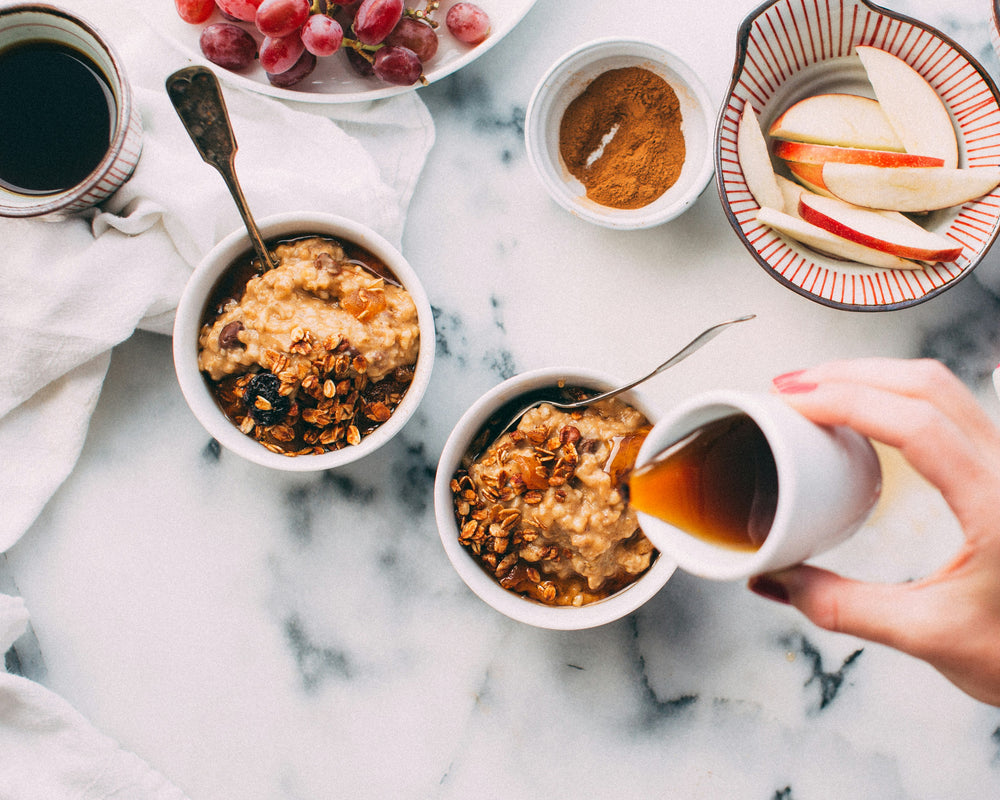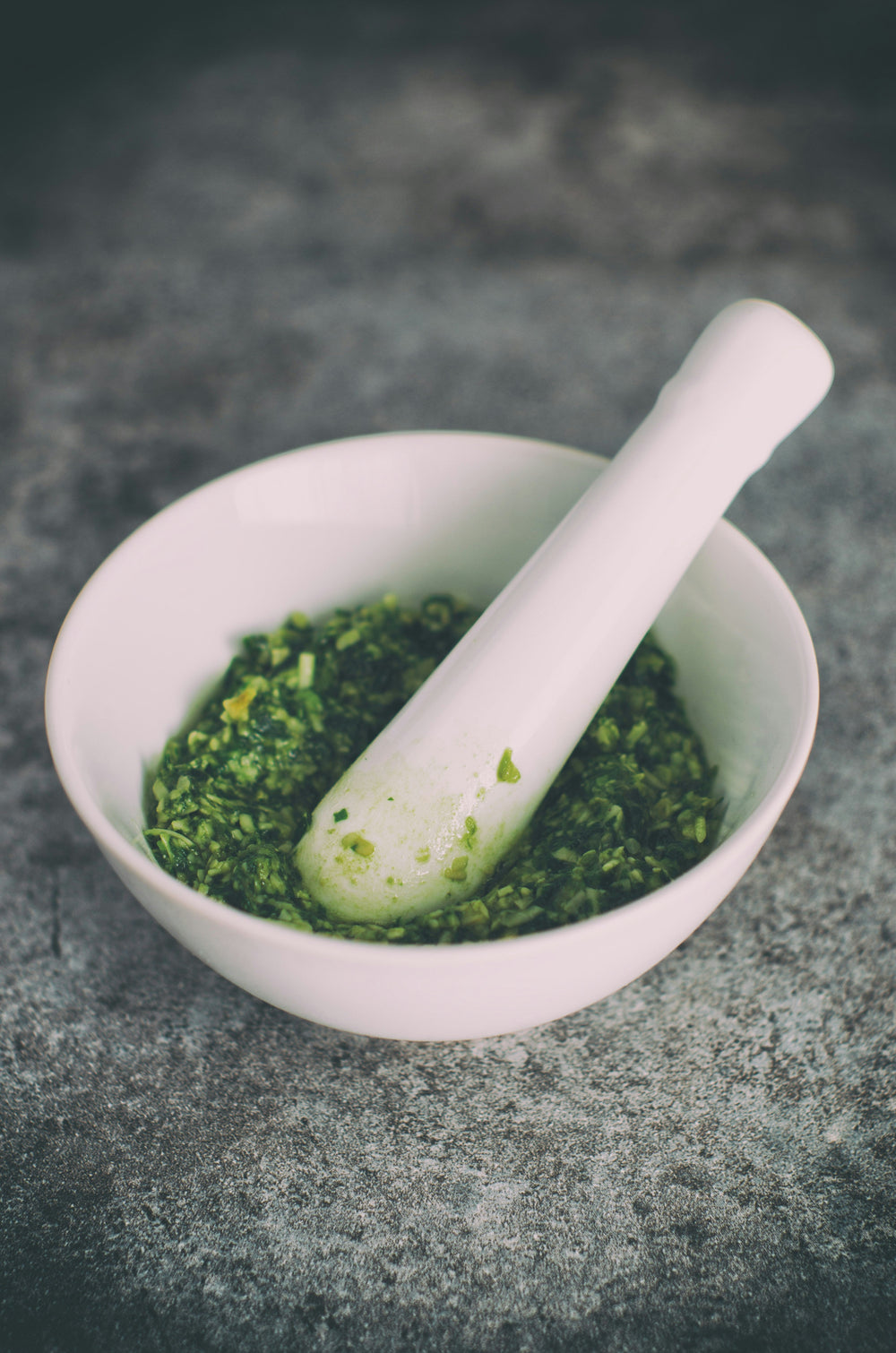This creamy green soup brings together broccoli, cauliflower, and kale for a delicious bowl that feels both comforting and energising. Finished with crispy chickpeas and toasted almonds, it is an easy way to enjoy a whole day’s worth of greens in one simple, nourishing meal.
8 common signs of dysbiosis: what to look for.
8 Common Signs of Dysbiosis: What to Look For Gut health is closely tied to digestion, mood, immunity, and even skin health. When the balance of bacteria in the gut shifts, it can trigger a wide range of symptoms that shouldn’t be ignored. What is Dysbiosis? Dysbiosis is a condition that occurs when the gut microbiome (the community of trillions of bacteria living in your digestive tract) becomes unbalanced. This often involves an overgrowth of harmful bacteria or yeast alongside a reduction in short-chain fatty acid (SCFA) producing bacteria that normally support gut health. At the same time, toxin-producing microbes can increase, disrupting the gut environment further. A weakened intestinal barrier is another consequence of dysbiosis, allowing bacteria or bacterial products to “leak” through the gut lining into the bloodstream — a process known as bacterial translocation. This can drive systemic inflammation (a long-lasting, body-wide immune response that can cause low-level irritation and affect overall health) , which may affect not only digestion but also energy levels, mood, and skin health. 1. Digestive Disturbances If you're frequently experiencing: Gas Bloating Constipation Diarrhoea These could be signs that your gut flora is out of balance. Healthy digestion relies on beneficial bacteria to process food and eliminate waste. When these good bacteria are reduced, your gut struggles to break food down efficiently, leading to discomfort. 2. Craving Sugar Do you find yourself craving sugar more often than usual? When there’s an overgrowth of harmful bacteria or yeast, they feed off sugar and thrive on it, creating a cycle where you crave more sugar to satisfy the bacteria’s needs. This can lead to excessive sugar consumption, which in turn can starve out beneficial bacteria, worsening the imbalance. 3. Food Sensitivities If you’ve developed new food sensitivities or allergies, your gut might be the...

8 Common Signs of Dysbiosis: What to Look For
Gut health is closely tied to digestion, mood, immunity, and even skin health. When the balance of bacteria in the gut shifts, it can trigger a wide range of symptoms that shouldn’t be ignored.
What is Dysbiosis?
Dysbiosis is a condition that occurs when the gut microbiome (the community of trillions of bacteria living in your digestive tract) becomes unbalanced. This often involves an overgrowth of harmful bacteria or yeast alongside a reduction in short-chain fatty acid (SCFA) producing bacteria that normally support gut health. At the same time, toxin-producing microbes can increase, disrupting the gut environment further.
A weakened intestinal barrier is another consequence of dysbiosis, allowing bacteria or bacterial products to “leak” through the gut lining into the bloodstream — a process known as bacterial translocation. This can drive systemic inflammation (a long-lasting, body-wide immune response that can cause low-level irritation and affect overall health) , which may affect not only digestion but also energy levels, mood, and skin health.
1. Digestive Disturbances
If you're frequently experiencing:
-
Gas
-
Bloating
-
Constipation
-
Diarrhoea
These could be signs that your gut flora is out of balance. Healthy digestion relies on beneficial bacteria to process food and eliminate waste. When these good bacteria are reduced, your gut struggles to break food down efficiently, leading to discomfort.
2. Craving Sugar
Do you find yourself craving sugar more often than usual? When there’s an overgrowth of harmful bacteria or yeast, they feed off sugar and thrive on it, creating a cycle where you crave more sugar to satisfy the bacteria’s needs. This can lead to excessive sugar consumption, which in turn can starve out beneficial bacteria, worsening the imbalance.
3. Food Sensitivities
If you’ve developed new food sensitivities or allergies, your gut might be the root cause. Dysbiosis is often linked to “leaky gut”, a condition where the intestinal lining becomes damaged, allowing toxins and food particles into the bloodstream. This triggers an immune response which can make you more reactive to certain foods over time, leading to food sensitivities or allergies. The cycle continues because the sensitivities maintain the leaky gut condition, making it a challenge to break the cycle.
4. Fatigue
A diverse gut microbiome is key for maintaining energy. This is because the gut plays a critical role in producing serotonin, a hormone that supports both your sleep and mood. Probiotics also produce short-chain fatty acids (SCFAs), which your body uses as a source of energy. If your gut is out of balance, serotonin production and SCFA availability may be impaired, leaving you feeling you feeling fatigued, foggy, and drained despite adequate rest.
5. Skin Reactions
If you’re noticing more breakouts or irritations than usual, your gut health might be contributing to the problem. Skin flare-ups are often associated with gut inflammation caused by dysbiosis. When the balance of good bacteria in the gut is disrupted, it can lead to systemic inflammation, which may manifest on your skin in the form of dull skin, acne, rashes and sometimes eczema. Improving your gut health may help calm inflammation and support clearer skin.
6. Weight Gain
When your gut is out of balance, it can affect blood sugar control and lead to insulin resistance. This makes it harder for the body to process sugar and can contribute to weight gain.
This can result in weight gain or difficulty losing weight. Additionally, the desire to eat more than necessary can increase due to reduced nutrient absorption, leaving you feeling unsatisfied and prompting overeating. If you’re gaining weight despite eating well and exercising, dysbiosis might be contributing to the issue.
7. Mood
The gut is often called the “second brain” because it produces neurotransmitters that regulate mood. Dysbiosis can interfere with serotonin and dopamine production, increasing the risk of anxiety, low mood, and even depression. If you’ve noticed sudden emotional changes, your gut may be influencing your mental health.
8. Getting Sick More Often
If you’ve noticed that you're catching colds more often, or experiencing frequent infections, your gut could be struggling to protect you. Around 70% of immune cells are housed in the gut. When dysbiosis occurs, it can weaken your immune defences, making you more prone to colds, infections, and slower recovery times. Restoring balance with probiotics and gut-friendly foods may help support immunity.
Why Synbiotics Can Support Gut Health
Synbiotics (a combination of probiotics and prebiotics) such as Epetōme, may provide complementary support for the gut microbiome in cases of dysbiosis. Probiotics can help maintain microbial diversity by introducing beneficial strains, while prebiotics selectively stimulate their growth. This dual action has been associated with improvements in short-chain fatty acid (SCFA) production, which plays a role in maintaining the integrity of the intestinal barrier. A healthier barrier function may in turn reduce the passage of bacterial products into the bloodstream, which is linked with systemic inflammation.
Conclusion
Dysbiosis is more than just a digestive issue and it can impact energy, mood, weight, skin, and immune health. Recognising the signs early is key to restoring balance in your gut microbiome. By supporting your gut with fibre-rich foods, probiotics, and healthy lifestyle habits, you can strengthen your digestion.
References
Alagiakrishnan, K., Morgadinho, J., & Halverson, T. (2024). Approach to the diagnosis and management of dysbiosis. Frontiers in Nutrition, 11, 1330903. https://doi.org/10.3389/fnut.2024.1330903
Carding, S., Verbeke, K., Vipond, D. T., Corfe, B. M., & Owen, L. J. (2015). Dysbiosis of the gut microbiota in disease. Microbial Ecology in Health and Disease, 26, 26191. https://doi.org/10.3402/mehd.v26.26191
Carías Domínguez, A. M., Rosa Salazar, D. de J., Stefanolo, J. P., Cruz Serrano, M. C., Casas, I. C., & Zuluaga Peña, J. R. (2025). Intestinal dysbiosis: Exploring definition, associated symptoms, and perspectives for a comprehensive understanding – a scoping review. Probiotics and Antimicrobial Proteins, 17(1), 440–449. https://doi.org/10.1007/s12602-024-10353-w
Li, C., Niu, Z., Zou, M., Liu, S., Wang, M., Gu, X., Lu, H., Tian, H., & Jha, R. (2020). Probiotics, prebiotics, and synbiotics regulate the intestinal microbiota differentially and restore the relative abundance of specific gut microorganisms. Journal of Dairy Science, 103(7), 5816–5829. https://doi.org/10.3168/jds.2019-18003
lifestyle. gut health recipes.
ready in 10 minutes
herb-whipped cottage cheese chicken bagels.
These basil whipped cottage cheese protein bagels make a fresh, high-protein breakfast or lunch, combining creamy herb-blended cottage cheese with juicy chicken, rocket, and tomatoes. They’re quick to assemble, packed with flavour, and perfect for a nourishing breakfast or light lunch.
ready in 10 minutes
kiwi chocolate protein chia pots.
These Kiwi Chocolate Protein Chia Pots make an ideal high-fibre, high-protein breakfast that keeps you full and energised all morning. They’re quick to prepare, easy to store, and perfect for a healthy grab-and-go option.
ready in 15 minutes
spiced apple porridge.
This spiced apple and pumpkin seed porridge is a warming, high-fibre breakfast that’s perfect for cosy mornings. Made with creamy oats, gently caramelised apples and a crunchy pumpkin seed topping, it’s ready in just 15 minutes and serves one.
ready in 50 minutes
prep-ahead baked blueberry oats.
These prep-ahead oven-baked oats with blueberries and bananas are rich in protein and fibre, making them a nourishing, gut-friendly breakfast to enjoy all week.
ready in 15 minutes
spicy green eggs with feta.
These spicy green eggs with feta are a quick, protein-rich recipe packed with gut-friendly ingredients like spinach, courgette, and spring onion. Baked in the oven or air fryer, they’re simple to make, full of flavour, and support digestion with a balance of fibre, protein, and healthy fats. Perfect for breakfast, brunch, or a light meal, this vibrant dish proves that nourishing your gut can be both delicious and easy.
ready in 10 minutes
egg wrap with pesto.
Bright, fresh, and ready in just 10 minutes, this flavour-packed wrap serves one and is ideal for breakfast, lunch, or any time you’re after something simple yet filling.
ready in 10 minutes
peach cobbler overnight oats.
Start your day with a gut-friendly twist on a classic dessert. The peach cobbler overnight oats serve 2–3 and takes just 10 minutes to prepare the night before. Packed with fibre, flavour and feel-good ingredients, it’s the perfect make-ahead option for busy mornings or a nourishing snack you can enjoy any time of day.
ready in 15 minutes
smoky egg salad bagel crunch.
This smoky harissa egg bagel is the perfect 15-minute meal. Made with creamy Greek yoghurt, tangy pickles, and a hint of spice, it’s a high-protein twist on classic egg salad that delivers on both taste and texture. Ideal for busy days, this easy bagel recipe makes lunch feel gourmet without the effort.
ready in 20 minutes
chewy breakfast matcha protein cookies.
Soft, satisfying, and subtly sweet—these breakfast cookies are made to fuel your morning the right way. With fibre-rich oats, plant-based protein, and antioxidant-packed matcha, they’re a gut-friendly grab-and-go option that doesn’t compromise on flavour or function.
ready in 15 minutes
lemon & poppy seed pancakes.
Emily's light, gut-friendly crêpes are the perfect balance of fibre, protein, and healthy fats to support digestion and keep you feeling great.
ready in 10 minutes
carrot cake breakfast oats.
Start your day with a delicious and nutritious breakfast option - Carrot Cake Oats. Filled with fibre diversity to promote healthy digestion.










































